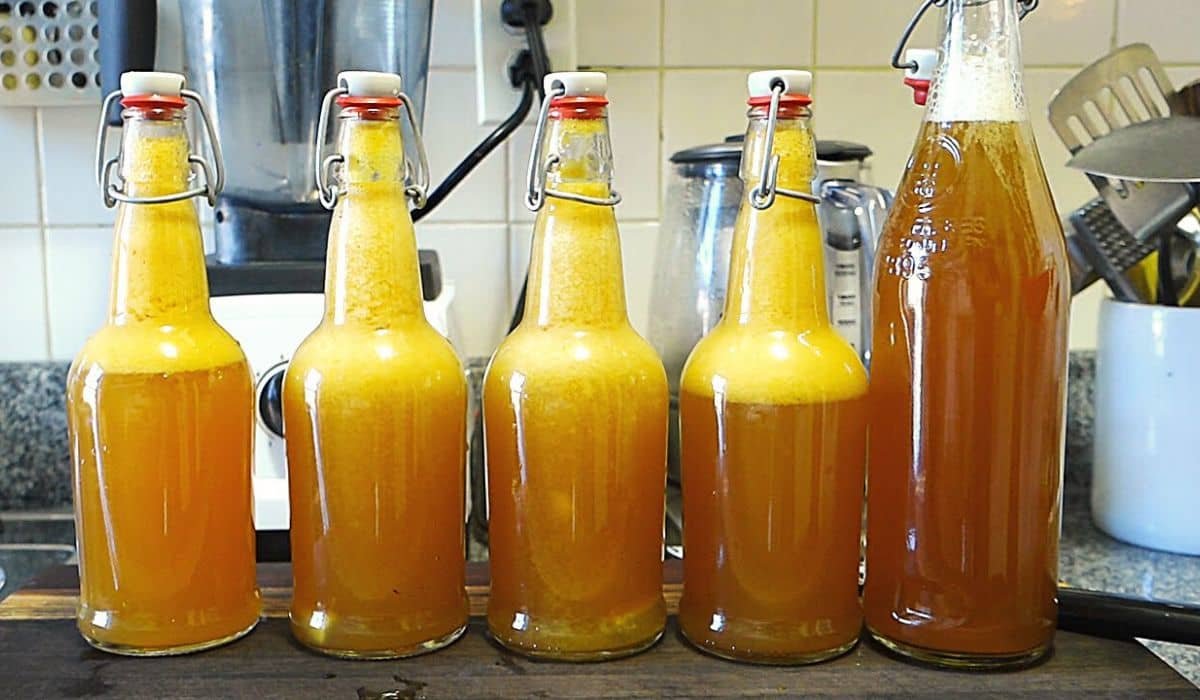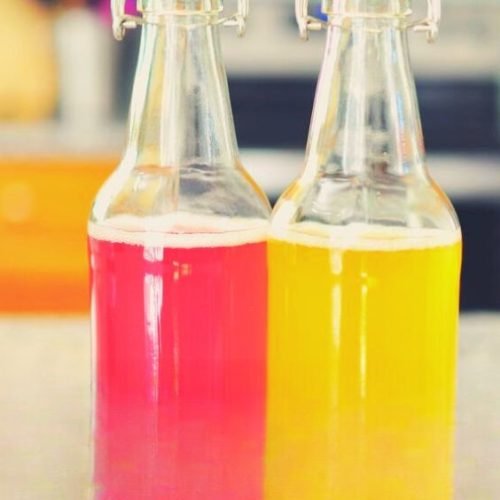Fermented Fruit Juice Recipe (FFJ): How To Make At Home

Are you trying to boost your health by exploring natural drinks? Maybe you’ve heard about fermented fruit juice and its health claims and are curious to try it out.
Many people are searching for homemade, wholesome alternatives to store-bought beverages – that let’s be honest, are some of the most-unhealthy things that you can put in you.
Traditional cultures have been fermenting foods for thousands of years, not only to preserve them but also for health benefits. Fermented fruit juice is part of this ancient wisdom, and it’s making a comeback as a gut-friendly option.
The good news is that making fermented fruit juice at home is easier than you might think. It’s a straightforward process that requires just a few basic ingredients and some time. In this article, you’ll learn step-by-step how to make your own delicious fermented juice using fruit juice, sugar, and water.
What is Fermented Fruit Juice?
Fermented fruit juice is a sweet, fizzy drink made by letting fruit sugars turn into alcohol with the help of good bacteria and yeasts. This fermentation process makes the juice a drink full of probiotics, which are great for your gut health.
Making it’s simple.
Take fresh fruit juice, mix in a starter culture which brings in the good bacteria and yeasts, and keep it somewhere warm for a few days. The bacteria and yeasts eat the sugars, and they make carbon dioxide, which makes the bubbles in the drink.
Fermented fruit is also full of enzymes, vitamins, and probiotics that can make your digestion better, strengthen your immune system, and could even make your skin look healthier.
Studies have shown that probiotics, like those found in fermented foods, can help with digestive issues and also boost the immune system. [1] [2]
So, if you want a healthy drink you can make at home, try making fermented fruit juice. It’s easier than you might think, and it’s good for you!
Fermented Fruit Juice (FFJ) Recipe

Fermented Fruit Juice Recipe
Equipment
- 1 small bowl
- 1 Clean glass jar About 1 liter
- 1 Wooden spoon
Instructions
- Mix the sugar and water in a small bowl
- Pour the yeast and stir slowly
- Let the mixture sit for 10 minutes to allow the yeast to activate
- Pour the fruit juice into a clean glass jar
- Add the sugar and yeast mixture, then screw on the lid
- Place the jar in a warm spot in your kitchen and allow it to ferment for 3-5 days
- Check on it each day, giving it a gentle shake
- When the fermentation process is complete, transfer the juice to a new jar and refrigerate.
Notes
- The fermentation process will make the juice less sweet and more intoxicating over time.
- You can use any type of fruit juice you like.
- Make sure to use a clean jar to prevent contamination.
- The juice should be stored in the refrigerator once the fermentation process is complete.
How To Make Your Jars Germ-Free For Fermentation
To make jars germ-free for fermentation, you can follow these steps:
- Add your jars to a large stockpot and cover with water (cover by at least one inch).
- Bring to a boil and let simmer for five minutes at a low, rolling boil.
- Add lids and covers into hot water and let sit until ready to fill with veggies.
- Remove carefully using tongs and place onto towels (cold countertops can shock the jars and break them)1.
- Let cool slightly then proceed with recipe.
TIPS:
- Please note that you should always choose jars that are meant for canning or preserving.
- Mason jars like Ball jars, Kerr jars, and other brands are made to be boiled in water for canning and thus can withstand the heat safely.
- Do not use recycled pasta sauce jars or similar: these are fine for storing food, but are of dubious quality glass and may shatter when boiled.
- If your jars do not fit into a stockpot, you can warm the glass under hot tap water. Just place jars in sink and carefully fill them until overflowing with boiling hot water. Ensure that boiling water covers the inside and outside rim of the jar. Let stand for five minutes, then drain water (carefully!).
Here’s a nicely-done video I’ve found that will help you understand the process even more:
Fermented Fruit Juice Benefits
Fermented Fruit Juices are becoming popular for their health benefits such as:
- Gut Health: Fermented fruit juice is full of good bacteria that can help with digestion. It can make your gut bacteria more balanced, which might help with stomach issues and make you feel better overall. [3]
- Immune System Support: When fruit is fermented, it can end up with more vitamins and minerals. These nutrients can help your body fight off sickness. A study by the National Center for Biotechnology Information suggests that fermented foods can support the immune system. [3] [4]
- Steady Energy: The sugars in fruit juice change during fermentation, which gives you a more stable source of energy without the sugar crash you get from sweet drinks.
Also, fermentation of various foods leads to the formation of antioxidants, bioactive compounds, anti-hypertensive peptides, anti-diabetic components, and FODMAP-reducing components. [5]
Adding fermented fruit juice to your daily diet could be a good move for your health.
Fermented Fruit Juice Nutrients
Fermented fruit juice is a simple and tasty drink that’s full of good stuff your body needs. It’s filled with vitamins, minerals, good bacteria, and stuff that helps your body fight off damage.
Here’s what you get from a glass of fermented fruit juice:
| Nutrient | Benefit | Source |
|---|---|---|
| Vitamins (A, C, E, and B-complex) | Help your immune system, keep cells healthy | Fruits like apples, oranges, grapes |
| Minerals (potassium, magnesium, calcium) | Good for your heart and bones | Fruits like bananas, strawberries, kiwis |
| Probiotics | Make digestion better, good for gut health | The fermentation process |
| Antioxidants | Combat harmful molecules, lower inflammation | Fruits like berries, pomegranates |
Adding fermented fruit juice to what you eat and drink can give you these important nutrients in a form that’s easy to take in.
Plus, it’s not just for drinking – you can use it in cooking like making a marinade, or as a dressing for salads. Give it a go and you’re actually doing something good for your body with each gulp.
Can fermented fruit juice be used as a fertilizer? If so, how effective is it?
Fermented fruit juice isn’t just for drinking or cooking – it can be a simple and natural plant food for your garden too. When fruits ferment, they break down, making nutrients like nitrogen, potassium, and phosphorus more available – these are key for healthy plant growth.
How good is this as a fertilizer?
Research indicates that using fermented fruit juice on plants can feed them, improve the soil, and might even help you get more fruits and veggies from your garden. Plus, it’s a green and money-saving option that’s easy to try.
To give it a go, mix your fermented juice with water – start with 1 part juice to 100 parts water – and water your plants with it.
Keep an eye on how your plants react and tweak the mix if you need to. But remember, too much of a good thing can be bad, so don’t go overboard or you might overfeed your plants.
What types of fruits are best suited for making fermented fruit juice?
Many kinds of fruit are great for FFJ – especially if they’re full of sugar and nutrients. Apples, pears, and grapes are often used because they’ve lots of natural sugars that help yeast and bacteria during fermentation.
These sugars are key for making the juice, and fruits with more sugars usually make a better-tasting drink.
- Citrus fruits like lemons, oranges, and grapefruits are okay too, but people usually mix them with sweeter fruits to make the taste better.
- Berries, like strawberries, blueberries, and raspberries, are good to use as well. They’ve lots of vitamins and antioxidants, which can make your fermented juice even healthier.
The stage of ripeness of the fruit is important. Fruits that are more ripe are usually sweeter, so they’re better for fermenting. But don’t use fruit that’s gone bad or has mold, as this can ruin the whole batch of juice.
Are there any potential risks or side effects associated with fermented fruit juice?
Making your own fermented fruit juice can be a cool project, but you should know about some possible risks and downsides.
For example, when you ferment fruit, bacteria and yeast grow to make the juice. If you don’t keep things clean or let the juice ferment too long, bad bacteria might grow and make you sick. [6]
Also, fermented juice can have alcohol in it. [7]
This is fine for some folks, but not if you don’t drink alcohol, are pregnant, or are giving it to kids.
Some people might get an upset stomach from drinking fermented juice. [8]
It’s packed with probiotics, which are good for you, but they can also make you bloated or gassy if you’re not used to them.
Bottom Line
Fermented fruit juice isn’t only a nutritious drink, but also a potent organic fertilizer. Its benefits, from boosting gut health to enriching soil, are impressive.
Plus, with this easy FFJ recipe, you can always have something healthy to drink in your house.
Check More Healthy Recipes
